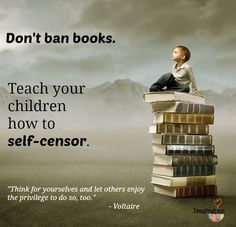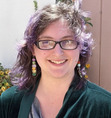Ellie Lieberman's Blog: Dusty Shelves - Posts Tagged "banned-books"
Help Corrupt Young Minds

When I was ten years old, I sat at my desk reading Go Ask Alice. My teacher came over, hands on her hips and asked me accusingly if my mother knew what I was reading. Looking up at her, I said, “She’s the one who gave it to me.” The reason she gave it to me was because it had an impact on her and, to be quite honest, it worked better than the DARE program ever did. And, when she was ten, her school board was asked to ban it. My mother always taught us to read everything, even the books considered most dangerous. Especially, the books considered most dangerous. As Oscar Wilde put it, “An idea that is not dangerous is unworthy of being called an idea.”
This is probably why censoring books seems ridiculous to me. And, why it shocked me in eighth grade, when we were told to pick a book and read it in small reading groups, a group of classmates of mine were told they had to choose a new book halfway through. Why? Because there was a scene, about a paragraph in length, that some of the teachers thought might be inappropriate. This was a book all those classmates were enjoying, and they were about the only ones in this reading program. Which book it was or what the scene was I have a very vague recollection of. But, I remember the disappointment and frustration they faced at suddenly having a beloved book taken away and forced to not only start over, but with a book that was nowhere near as good.
And, it is also probably why it startled me at the age of 18 when I went to pick up On the Road that I ordered through the local library, the librarian asked if I was 18 or over, as though she would not give it to me if I wasn’t. I remember walking home thinking what a strange question that was. What difference would my age make? And then, when I realized the implication behind the question, it made me angry. Who was she to try to censor my reading?
The books I wind up enjoying and loving the most have been banned or challenge, even if I do not seek them out for this reason. Why? I love the themes they talk about. I love their depth and the way they make me think and feel. Oscar Wilde also said, “The books the world calls immortal are the books that show the world its own shame.” And these are the books that taught me to have a passion for reading, that ignited that flame, even when public education’s “English” and “literature” courses threatened to blow it out.
There is a magic to a book you pick up on your own. And there’s even more enticement when you are told you shouldn’t pick up that book at all. This is why The Uprise Books Project is so essential. By giving underprivileged teens, free of charge, the very books that many have tried forbid them and other readers, they help end the cycle of poverty through literacy and establish a love and passion of reading.
Most if not all of the books referenced or read in Society's Foundlings has and/or is banned and/or challenged, even Winnie the Pooh. The reason was not intentional; it was simply the books they could relate to most. It was the books that spoke to them in a way nothing else did, with the exception of music and movies. It made them feel not quite so alone. As Clem put it, “Those moments you go, “Yeah, someone else gets it. That’s what it’s like.” It doesn’t matter if it’s fictional, because you whisper to the page words of mutual understanding.”
It seemed only fitting to have Society's Foundlings support The Uprise Books Project. 10% of the proceeds of Society's Foundlings will now go to helping corrupt young minds. If you would like to aid in this incredible cause, check out their website: http://uprisebooks.org/
Published on October 24, 2015 18:27
•
Tags:
banned-book-week, banned-books, censorship, challenged-book, charity, corrupt-young-minds, ending-poverty, go-ask-alice, literacy, on-the-road, oscar-wilde, passion-for-reading, society-s-foundlings, teen-reads, the-uprise-books-project, underprivileged-teens
Lessons from the Lunchroom Table: Self Censorship

As a side job to support my writing career, I work as a yard supervisor at an elementary school. Part of this job includes assisting children in the lunchroom. That was what I was doing when some students noticed a cloud of smoke in the distance beyond the fence on the other side of the playground.
A group of the students began speculating as to what might be the cause of the smoke. A fire seemed to be the most likely culprit, according to them. A house fire.
Another little boy raised his hand to get my attention and informed me that he not only did not appreciate the type of conversation but that it was putting him off his lunch. I suggested to the group of students that they needed to respect the fact this other kid asked them to please stop and maybe speak quieter so the other student did not have to hear and could finish his food. Understandably, a conversation of that nature is rather frightening and even unsettling to think about. And, all in all, it is lunch time and the boy needed to be able to eat his food.
As I walked away from the table, something about how I handled the situation did not sit right. What happened kept replaying in my head and upon a minute or so of more thought led me to another way of looking at it.
Why shouldn't that group of students still be allowed to talk and speculate? Yes, it was an unsettling conversation, but what did it teach to them and that boy about when unsettling conversations are brought up? Just as that boy has a right to eat his lunch in peace, that group of students had a right to talk it out.
Talking is a way of coping. And smoke, like a car accident, is hard to ignore. Human nature lends itself to curiosity and often talking it out is a way to reach an understanding.
I went back to the table and told that boy, "You know what? Just as they need to respect that you don't like this conversation, you need to respect that they might need this conversation. If you ever find yourself in a situation where you don't like what is being talked about, you don't like what show just came on television, you don't like a certain book, you can remove yourself from the conversation. I understand that it is frightening or unsettling, but if they keep talking about it and you can still hear it, you can take your lunch and move to a different seat."
Big concept in a seemingly little moment, self censorship. It reminded me of banning books. Amazing books that bring up some incredible conversation, but because one person objects, suddenly they try to silence it, ban it. More often than not, these are conversations we need to have, too. That people do more harm than good in trying to censor others, rather than simply censoring for themselves.
Published on May 01, 2016 13:02
•
Tags:
banned-books, conversations, elementary-school, essential-conversations, hard-conversations, important-conversations, learning-self-censorship, self-censorship



